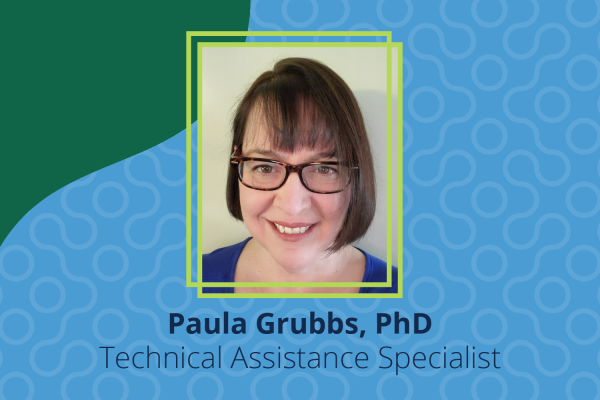
FPG Profile: Paula Grubbs
Paula Grubbs, PhD, is a technical assistance specialist at the UNC Frank Porter Graham Child Development Institute (FPG). While she spends much of her time working with the Early Childhood Technical Assistance Center (ECTA), Grubbs also works on the Kindergarten Sturdy Bridge and the NC Data Governance projects.
As part of our FPG profile series, we recently spoke with Grubbs to learn more about her work at FPG. Here’s what she had to say.
Tell us a bit about your professional journey―and what brought you to FPG?
I began working at FPG in June 2020. Immediately prior to coming to FPG, I was the early childhood/pre-kindergarten director in a school district in North Carolina. Although I’ve worked in the birth to age 8 space throughout my career, I’ve focused on early childhood special education/early childhood education. I tell people if it’s a role in early childhood or early childhood special education, I’ve probably done it! I’ve served as a child care teacher, an early interventionist, an early childhood special educator, a district-level administrator, a faculty member and department leader in personnel preparation programs, and a community NC PreK Program director. In my district-level position, I received technical assistance and coaching from FPG staff. When I saw a position was available, I immediately applied.
What do you do at FPG—describe your job, walk us through a typical day, and tell us about the projects you're currently working on.
In my role as a technical assistance specialist, no two days are the same. I work on multiple projects: the Early Childhood Technical Assistance Center (ECTA), Kindergarten Sturdy Bridge, and the NC Data Governance Project. I may be working directly with states to support implementation of IDEA Part C and Part B Section 619 programs, planning a learning community focusing on state-level kindergarten infrastructure and policies or local implementation of effective practices, discussing the personnel shortage in early intervention and early childhood special education, or focusing on data governance. Each day I learn new things and work with amazing colleagues.
What do you like most about your job?
I feel so fortunate to serve at FPG; it’s hard to decide what I like most about my job. I find my work interesting because it is responsive to the needs of the field and facilitates the implementation of effective, high leverage practices. I enjoy supporting state and local leaders as they build and sustain equitable, high-quality systems for young children and their families. I appreciate the opportunity to collaborate with professionals that share the same goal: transforming the lives of children and families.
What do you find most challenging?
What I find most challenging is the same thing I like about my job: supporting the development of systems and focusing on the use of practices that lead to improved child and family outcomes. Although national issues are felt differently in each state and community, the continued gap between the implementation of high leverage practices and the lived experiences of young children and families in the early years (in particular young children with disabilities), kindergarten, and the early grades is frustrating. I hope that my efforts (in collaboration with colleagues) decrease this gap.
How does your work further the mission of FPG?
I hope that my work supports states, local programs, and staff who serve children and families to develop effective systems and use evidence-based practices that lead to strong child outcomes. At FPG, we have the unique opportunity to make a difference in the lives of children and families.
What do you hope to have accomplished five years from now?
I hope to have continued to develop my skills in technical assistance and implementation support.
